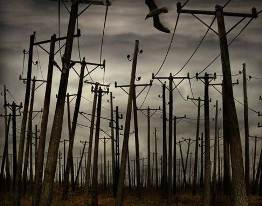 So much of our public debate has been about the role of government; how big is too big, how small is too ineffective.
So much of our public debate has been about the role of government; how big is too big, how small is too ineffective.
Constitutionalists define the responsibility of central government to maintaining our basic infrastructure and to “provide for the common Defense and general Welfare of the United States.”
Pretty loose guidelines, actually, and allows for all sorts of elastic interpretation, but it can be seen as a fairly limited realm of responsibility, as well. The debate will rage on as to what “general welfare” means in the first place, how broad is “defense” and where does infrastructure begin and end? Can we, as laborers, be considered part of the infrastructure? When does defense become invasive and when has it grown past relevant costs?
The founding fathers left many concepts vague on purpose (the 2nd Amendment); they were visionaries and realized that the world will evolve and change and that any charter, if it is to remain relevant and serve the people, must be interpreted as society changes and must have the ability to grow along with us.
society changes and must have the ability to grow along with us.
They did not imagine nuclear weapons, airplanes, paved superhighways, skyscrapers or even electrification. With all of these technologies come new responsibilities and necessary safeguards and regulations to contain the unforeseen complications and weight of conflicting interests.
Maybe we’re having the wrong debate. Or maybe there is another part of this debate that we need to have in order to reach a better understanding of what is at stake.
I posit this: The scope of government is not going to resolve until we decide what kind of society we want to be and what it means to be civilized. Government is a somewhat amorphous construct and it cannot serve effectively unless there is an idea of what it is that government is serving.
I’ll offer a couple of definitions to illustrate my premise:
A “society” is an organized group of persons associated together for religious, cultural, scientific, political or patriotic purposes.
A “civilization” is an advanced state of intellectual, cultural and material development in society, marked by progress in the arts and sciences and the appearance of complex political and social institutions.
What, therefore, is America if not a “civilized society”? Isn’t that something that we can all agree on? America is a diverse group of people who share many purposes and common goals in the pursuit of life, liberty and happiness, and we do so with a moral standard that is humane and ethical. Sounds pretty irrefutable to me.
The problem is…we haven’t come to a mutual understanding that the government of this community must also value and promote these concepts of civilization; the intellectual, cultural, scientific, artistic and material progress that binds, protects and advances us.
This is where the left begins to separate from the right, but it is also where we could find some common ground so long as we understand what it means to be civilized.
How can a civilized society, for example, deny hungry school children, whose families cannot afford school lunches, more meal programs? How can we say, as American children show increasing signs of poor health, that we should not communally improve  nutritional standards?
nutritional standards?
Shouldn’t this be within the domain of a representative government? Wouldn’t a civilized society demand that everything be done to enrich the health and education of all children?
In my view, the definition of marriage in a civilized society would be the legal recognition of a loving union between consenting adults regardless of their sexual orientation.
In my view, a civilized society recognizes the importance of their workers by demanding living wages, extend benefits and offset the unemployment caused by economic failures.
A civilized society, while maintaining a free market, will understand that profit is not a moral directive and that sometimes doing the “right thing” is not always the most “profitable thing.”
 Shouldn’t we, if civilized, proudly embrace the progress of science and take ethical responsibility on the world stage to lead in green technologies and initiatives that will create a cleaner environment?
Shouldn’t we, if civilized, proudly embrace the progress of science and take ethical responsibility on the world stage to lead in green technologies and initiatives that will create a cleaner environment?
While some may not agree on the few issues I presented here, I would at least ask that everyone start defining these concepts: What does it mean to be civilized? What is a fair and just society? And what is our measure for the success of these ideas?
Let’s ask those questions first. Let’s determine what we want to be and what we don’t want to be; then we can start the conversation about the role of government and what is too big or too ineffective.